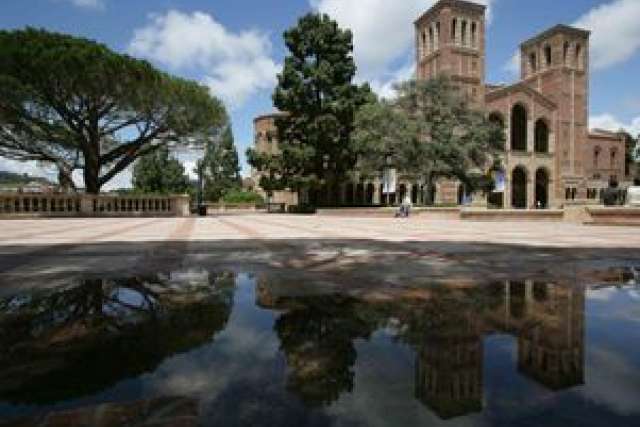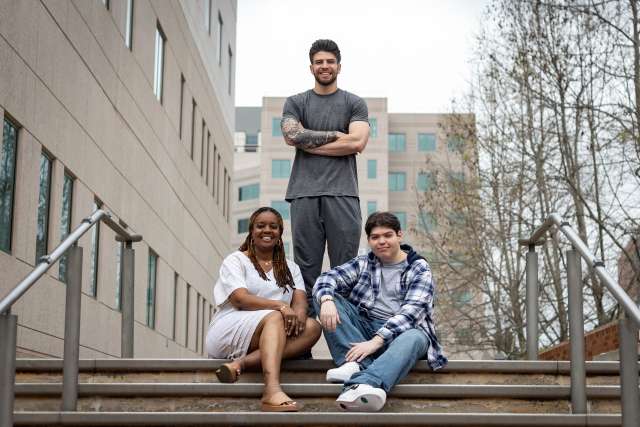Drawn from the sciences, the arts and humanities, business, public affairs, and the nonprofit sector, the academy's 202 new fellows and 16 foreign honorary members are leaders in their fields and include recipients of the Nobel Prize; the Pulitzer Prize; the National Medal of the Arts; MacArthur, Guggenheim and Fulbright fellowships; and Grammy, Emmy, Oscar and Tony awards.?
UCLA had more scholars elected to the academy this year than any other public university. The only institutions with more 2014 fellows were Harvard and Stanford.
The new fellows from UCLA are:
Chris Burden
Professor emeritus of art
Burden, who taught at UCLA from 1978 to 2005, is a Los Angeles–based conceptual artist best known for his performance art pieces of the 1970s. His installations and sculptures, which have been exhibited throughout the world, have constantly challenged beliefs and attitudes about art and the contemporary world.
Johanna Ruth Drucker
Bernard and Martin Breslauer Professor of Bibliographical Studies, Graduate School of Education and Information Studies
Drucker is internationally known for her work in the history of graphic design, typography, experimental poetry, fine art and digital humanities. She has also garnered a reputation as a book artist, and her limited-edition works are in special collections and libraries worldwide. Her most recent titles include "SpecLab: Digital Aesthetics and Speculative Computing" and "Graphic Design History: A Critical Guide." She is currently working on a database memoir, "ALL"; the online Museum of Writing, in collaboration with University College London and King's College; and a letterpress project titled "Stochastic Poetics."
Louis M. Gomez
John D. and Catherine T. MacArthur Foundation Professor of Digital Media and Learning, Graduate School of Education and Information Studies
Gomez works to bring state-of-the-art computing and networking technologies into traditionally underserved schools to help transform instruction and support community formation. Most recently, he has turned his attention to problems associated with the day-to-day work of teaching and learning and the institutions in which these activities occur. His work transcends traditional divisions and has had a significant impact on urban schools. Gomez has served since 2008 as a senior partner at the Carnegie Foundation for the Advancement of Teaching and holds several board and committee appointments.
Patricia Marks Greenfield
Distinguished professor of psychology
Greenfield's central theoretical and research interest is the relationship between culture and human development. She is a recipient of the American Association for the Advancement of Science's Award for Behavioral Science Research, the American Psychological Association's Urie Bronfenbrenner Award for Lifetime Contribution to Developmental Psychology in the Service of Science and Society, and the Society for Research in Child Development's Distinguished Contributions to Cultural and Contextual Factors in Child Development Award.
Sabeeha Merchant
Distinguished professor of chemistry and biochemistry
Merchant studies metabolic flexibility in plants in response to environmental stress, including mineral nutrient limitation, a problem that limits plant productivity and contributes to "hidden hunger," which affects one in three people worldwide. She was the lead author of a major study interpreting the genome of a tiny green alga called Chlamydomonas, which resulted in a treasure trove of data of great importance to agriculture, bioenergy and research on human diseases. Merchant has been named editor-in-chief of the prestigious journal The Plant Cell, a publication of the American Society of Plant Biologists. The society recognized her research contributions with the Shull Award in 2009 and the Kettering Award in 2010. She was honored with the Gilbert Morgan Smith Medal from the National Academy of Sciences in 2006 and was elected to the National Academy of Sciences in 2012.
Marcelo M. Suárez-Orozco
Dean of the Graduate School of Education and Information Studies and distinguished professor of education
Suárez-Orozco's research focuses on conceptual and empirical problems in cultural psychology and psychological anthropology, with a focus on mass migration, globalization and education. He has written numerous essays, award-winning books and scholarly papers in a range of disciplines and languages. A recipient of the Mexican Order of the Aztec Eagle, Mexico's highest honor bestowed on a foreign national, he was elected to the National Academy of Education in 2004. In 2012, he served as a special adviser to the chief prosecutor at the International Criminal Court in the Hague, and in 2013, he co-authored for Pope Francis the Pontifical Academy of Science's statement "Bread and Brain: Education and Poverty."
A. Eugene Washington
Vice chancellor for health sciences, dean of the David Geffen School of Medicine, CEO of the UCLA Health System, and distinguished professor of gynecology and health policy
Washington is an internationally renowned clinical investigator and health policy scholar whose wide-ranging research has been instrumental in shaping national health policy and practice guidelines. He has published extensively in the areas of of prenatal genetic testing, cervical cancer screening and prevention, noncancerous uterine conditions management, reproductive tract infections, quality of health care, and racial and ethnic disparities in health outcomes. Washington has received numerous honors and awards, including the Outstanding Service Medal from the U.S. Public Health Service and election to the Institute of Medicine, part of the National Academies.
Paul S. Weiss
Director of the California NanoSystems Institute, Fred Kavli Professor of Nanosystems Sciences and distinguished professor of chemistry and biochemistry and of materials science and engineering
Weiss explores the ultimate limits of miniaturization, focusing on the atomic-scale chemical, physical, optical, mechanical and electronic properties of surfaces and supramolecular assemblies. He and his students have developed new techniques to expand the applicability and chemical specificity of scanning probe microscopies and have applied these and other tools to the study of catalysis, self- and directed assembly, and molecular and nanoscale electronics. They work to advance nanofabrication down to ever smaller scales and greater chemical specificity in order to operate and to test functional molecular assemblies and to connect these to the biological and chemical worlds.
Since its founding in 1780, the American Academy of Arts and Sciences has elected leading "thinkers and doers" from each generation, including George Washington and Benjamin Franklin in the 18th century, Daniel Webster and Ralph Waldo Emerson in the 19th, and Margaret Meade and Martin Luther King Jr. in the 20th. The current membership includes more than 250 Nobel laureates and more than 60 Pulitzer Prize winners. UCLA Chancellor Gene Block was elected to the academy as a member of the 2010 class.
"It is a privilege to honor these men and women for their extraordinary individual accomplishments," said Don Randel, chair of the academy's board of directors. "The knowledge and expertise of our members give the academy a unique capacity — and responsibility — to provide practical policy solutions to the pressing challenges of the day. We look forward to engaging our new members in this work."
The new class of fellows will be inducted at a ceremony on Oct. 11 at the academy's headquarters in Cambridge, Mass.
See the full list of 2014 fellows.
Rebecca Kendall



